What Is The Truth About ISIS?
By Peter Chamberlin
04 September, 2014
Countercurrents.org

A detainee appears before the Multinational Forces Review Committee. This is one of Camp Bucca's programs that help detainees to reintegrate into Iraqi society. (Department of Defense photo/Pfc. Amie J. McMillan)
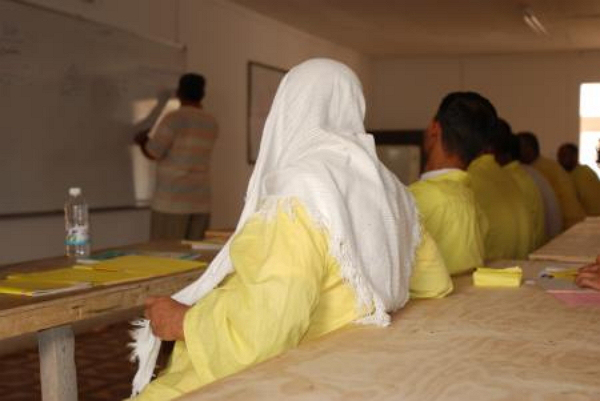
An instructor provides a mathematical lesson to detainees at the theater internment facility in Camp Bucca, Iraq. The class is part of the educational opportunities available to the detainees to help them get a better job and serve as an example for their community upon their release. (Department of Defense photo/Pfc. Amie J. McMillan)
What is the truth about ISIS?
Is it an ISIS/ISIS a pseudo-gang, working for the CIA, or is it merely a bi-product of the US/Saudi strategic union? There has not yet been another serious explanation put forth, other than this, to explain their meteoric rise to sudden terror stardom in 2014, when they were "being kept on life support" in mid-2012. Despite the non-serious explanations offered by some serious mis-informers to the contrary (State Dept, Al-Arabiya), "bank robberies, extortion and kidnapping" do not explain the sudden mobility, or capability to mount continual operations, by a small army of thousands of men, with an apparently limitless supply of modern weaponry, spread-out over 2-1/2 states (still working on Lebanon). Such an army could NOT exist without a state sponsor.
In trying to use the Internet as primary (only) source, we first learn that there are many questions that are nearly impossible to answer effectively there, because of the constant "scrubbing" (deleting) of information that is embarrassing to the owner of the Internet (USA), or to its minions. It is not even necessary to delete articles there to hide them, a simple extra space or extra letter in the title link will nullify all further links made back to the article of embarrassment.
In addition, researchers must rely upon Google Translate to unlock all articles in the foreign press, effectively turning most translations into gibberish. For an English researcher wanting to locate specific articles in Arabic, or other tongues, there is also that annoying foreigner habit of adding their own letters to words (words with multiple spellings), thus making a nearly impossible task even harder.
Nonetheless, I continue to pursue the origins of the "Islamic State" or the history of its leaders, looking for the smoking guns to tie the movable "false flag" to its state benefactors. From the evidence that still remains on the Web, I soon discovered that the ISIL leadership (photos and history below) has links to Iraqi internment Camp Bucca…but, this is a story with many holes.
By my own "guesstimate," ISIS is the result of a failed US Army behavioral modification program at Camp Bucca, Umm Qasr, Iraq, between 2007 and its closure in 2009.
If it is true that alleged ISIS leader "Abu Bakr al-Baghdadi" was ever in Camp Bucca then he went through the Camp 134 Process, subjecting him to a "behavior modification" process, part of a "proactive counterinsurgency strategy" for detention operations (according to Detention Operations, Behavior Modification, and Counterinsurgency, from the US ARMY COMBINED ARMS CENTER). If al-Baghdadi or other ISIS members were at Bucca, they were herded through a dividing process, which identified the "unreconcilable" insurgents, in order to sequester them away from the general population. "Moderates or former extremists moving toward moderation" were separated for special treatment intended turn them away from extremist beliefs, before "releas[ing] them to return to their homes as "moderate missiles of the mind." The mission at Bucca was to "modify the behavior of detainees so that when they reenter Iraqi society, they are no longer threats to the Iraqi government and coalition forces but rather agents of change for the future of Iraq."
Before pursuing the question of the truth about ISIS, we must ask whether this behavior modification process successful, or did it have an unanticipated opposite result? It seems pretty obvious from our perspective that graduates of the ISIS program went on to become the world's most notorious terrorist army, a grave threat to world peace? Was this the result of a failed overt detainee/prisoner strategy, or was this the intended result? Was the US Army training terrorists at Bucca, or did its proactive counterinsurgency strategy for detention operations" to turn the prison system into "a legitimate
arena for counterinsurgency actions" backfire miserably, producing a generation of terrorist-jihadis like the world has never seen?
Consider what follows to be "hole-filler" in that storyline, hopefully helping readers to link the terrorists back to their state sponsors.
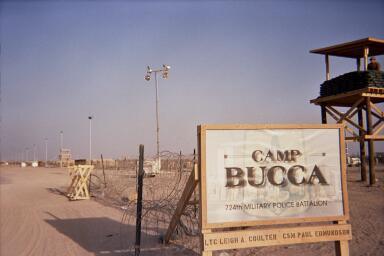
ISIS: Who is former Imam Abu Omar Al Baghdadi and the top ISIS leaders?
Saudi Al-Arabiya provided the graphic answer below (making the text automatically suspicious). Click on the photo or the Arabiya link to view readable text.�
1- Abu Bakr al-Baghdadi―-BUCCA
2- Abu Ayman al-Iraqi―-BUCCA
3- Abu Ahmad al-Alwani
4- Abu Abdulrahman al-Bilawi―-BUCCA
5- Haji Bakr―-BUCCA
6- Abu Fatima al-Jaheishi
What is significant about Camp Bucca?
It was the primary site for an experimental US Army behavioral modification program, Task Force 134, "Detention Operations Process," which got into detainees home and their lives, as well as reconditioning their heads.
DR AMI M. Angell�rehabilitation programme leader at Camp Bucca.
"I think our efforts were successful. In fact, so successful that three previous Al Qaeda operatives [see confirmation by Dr. Angell] went through all the programs, were released, and then returned to work the programs as civilians." (1)
"They were guided by a psychiatrist and art instructor nick
named Picasso � once an Al-Qaeda operative and a detainee at Camp Bucca." (2b)�["They discussed issues such as violence and Iraq's future, before expressing their feelings in art." ]
FURTHER TESTIMONY FROM DR. ANGELL�
"The spare time led some to start radical religious classes so some moderate detainees were converted into extremists. 'When we came up with rehab programmes as a solution, the American military was very against it,…They didn't understand why we are spending money on rehab when we are going to leave the country eventually.'�"The Art of Rehabilitating Terrorists" (2)
"The rehab programme won the support of US Marine Major-General Douglas Stone. Initial funding was enough for 'religious rehabilitation' for only 30 detainees. She brought in well-respected imams to teach them about the Quran. 'We saw a thirst for education as the other detainees all wanted to know what the 30 learnt,' said Dr Angell.�[confirmation comes from former Bucca detainee Adel Jasim Mohammed.via Al Jazeera (below)--ed.] 'Because many of them were uneducated, those who went for the classes were shocked to learn that what they had thought of Islam was flawed. 'They didn't question what people told them and didn't even understand the reasons for many things, from washing hands and feet before prayers to why they pray.' (2a)
"They discussed issues such as violence and Iraq's future, before expressing their feelings in art. They were guided by a psychiatrist and art instructor nick named Picasso � once an Al-Qaeda operative and a detainee at Camp Bucca." (2b)
Through Dr. Angell's program, a "moderate" Imam was brought in to teach religious classes at "Bucca Freedom School." He was given a list of religiously inclined detainees and allowed to pick 10-12 to mentor closely, with allegedly moderate ideas. Those special students were allowed to hold religion classes for hundreds of students. For all we know, that list of religious trainees formed the basis for the "Islamic State." Again, intentional, or the biggest "cluster-fuck" of all time?
US Iraq jail an 'al-Qaeda school'�"Former inmates of Camp Bucca say military prison was training ground for extremism.
Adel Jasim Mohammed, a former detainee of Camp Bucca near Umm Qasr, said that US officials did nothing to stop radicals from indoctrinating young detainees at the camp.
"Extremists had freedom to educate the young detainees. I saw them giving courses using classroom boards on how to use explosives, weapons and how to become suicide bombers," Mohammed said.
"For the Americans we felt it was normal. They did not stop them [the radicals]."
…In 2005, an extremist was sent to our camp. At first, Sunnis and Shias rejected his teachings. But we were told that he was imposed by the prison authority," he said.
"He stayed for a week and recruited 25 of the 34 detainees � they became extremists like him."
Was this visiting scholar of radical Islam the same man who now calls himself Emir of the self-declared "Caliphate"?
Abu Bakr Baghdadi allegedly took the helm of "Al Qaida In Iraq," after the death of the terrorist leader known as Abu Musab al-Zarqawi in June 2006
The combined real and fake histories of Abu Bakr Baghdadi paint a portrait of an Iraqi from Ramadi in Anbar Province, who was allegedly a scholar of Islam with a master's degree and a PhD in Islamic studies from University of Islamic Sciences in Baghdad. He was allegedly captured by American forces sometime in 2003, before allegedly being released to the Iraqis in 2004. All articles repeating the claim that Baghdadi was held at Camp Bucca until its closure, can be traced back to this article from The Daily Beast. There is no information to be found on the Internet to fill in the gaps about his his time with the Iraqis, revealing where (or even if) he was held, but we know for certain that the only known photo of the man whom the Western media call "al-Baghdadi" came from the Iraq Min. of Interior. We cannot know for certain that the man held and released by American forces back then is the same man who now calls himself "Caliph Ibrahim."
How ten months at US run Camp Bucca in 2004 transformed Abu Bakr al-Baghdadi into a ruthless foe
"Many of us at Camp Bucca were concerned that instead of just holding detainees, we had created a pressure cooker for extremism."�James Skylar Gerrond, a former compound commander at Camp Bucca in 2006 and 2007
Critics of the facility say it had in effect become a terror training institute, run by resentful inmates under a strict interpretation of Islamic law.
"It is al-Qa'ida central down there," said Sheikh Ali Hatem Suleiman, a tribal leader from Anbar province. "What better way to teach everyone how to become fanatical than put them all together for scant reason, then deprive them?"
[SEE: Behind the Scenes: Walking amid 2,000 al Qaeda suspects ]
The Battle Behind the Wire�Rand Corp].
Reform School for Radicals, Marisa L. Porges
July 1, 2011
To varying degrees, these initiatives also include religious education, from one-on-one meetings with local religious leaders who discuss ideological sources of radicalization to group sessions that review the Quran and Islamic law. In Iraq, the "Countering Extremism with Enlightenment", or Tanweer program, was modeled after early efforts in Saudi Arabia. Clerics and social workers led a religious dialogue to advance moderate views of Islam while promoting civic duties associated with Iraqi democracy.
US risks fanning violence as it opens gates of Iraqi detention camps�April 19, 2009
On Aug. 19, 2009, a series of massive car-bombs announced the rebirth of Al-Qaeda in Iraq (AQI)�Scores dead as Baghdad rocked by series of massive explosions
Sept. 17, 2009, Camp Bucca Detention Center Closes in Iraq…thousands of inmates are set free in southern Iraq, near the Kuwaiti border.
"An Air Force C-17 carrying the last group of 180 detainees lifted off from the Basra airport headed to Camp Cropper."
AL-QAIDA IN IRAQ ON THE ROPE
The following is also taken from the July 22, 2008 al�Qa`ida's Road In and Out of Iraq. Analysis from West Point expert on Iraq, Dr. Michael Knights�
" AQI is a wounded organization….foreign fighters are now trying to leave the country."
That was Dr. Knights' opinion on AQI in July 2008, the following is his assessment on July 31, 2012--
"The Sunni insurgencies (plural) are being kept on life support."
"It is clear that AQI has benefited from an unprecedented infusion of trained terrorist manpower. Many of the released persons spent time planning inside detention facilities like Camp Bucca and Camp Cropper, specifically so they could launch a smarter, stronger insurgent effort one day."
In this testimony by Dr. Knights before the House Foreign Affairs Committee on December 12, 2013 (SEE: The Resurgence of Al-Qaeda in Iraq), he referred to a previous article that he had written on February 24, 2012 for the West Point Center for Combating Terrorism (which has apparently been erased from the Internet, for some reason), called "Back with a vengeance: Al-Qaeda in Iraq rebounds." This article is cited frequently by researchers who search for the roots of "Islamic State." It described a spent organization, headed for the great dust bin of history, far different from the supercharged terrorist organization that is tearing across Iraq and Syria, as described in Knights' August 27, 2014 testimony (SEE: ISIL's Political-Military Power in Iraq).
The following excerpts come from that erased assessment�
"By the middle of 2010, Al-Qaeda in Iraq was dead on its feet. The organization suffered critical setbacks in late 2006 and early 2007 as Sunni Arab tribal militias � the Sahwa (Awakening) � turned against Al-Qaeda. In parallel the U.S.-led military effort protected the Sahwa and executed high-tempo remorseless counter-terrorism operations that ripped Al-Qaeda in Iraq to pieces. The group's foreign volunteers and money started to dry up. Al-Qaeda cells began to process of disintegrating into local criminal franchises that now kidnapped and extorted to pay their salaries rather than fund insurgency. In April 2010 Al-Qaeda in Iraq lost its two most senior leaders � AQI emir Abu Omar al-Baghdadi and war minister Abu Ayyub al-Masri � and stood in the verge of "disintegration" according to the US commander in Iraq, General Ray Odierno. In a press conference on June 4, 2010, Odierno noted: "Over the last 90 days or so, we've either picked up or killed 34 out of the top 42 Al-Qaeda in Iraq leaders."
"By early 2012 it was clear that the deaths of AQI's senior leaders were a watershed event that unfolded just as the movement sought to find a new way to operate in Iraq. Numerous processes have unfolded since Al-Qaeda's defeat in 2006-2009, including the release of large numbers of experienced militants from U.S. detention facilities, changes in the balance of foreign and Iraqi fighters within the movement, the withdrawal of U.S. forces, and determined attempts by Al-Qaeda in Iraq to learn from its mistakes. These changes crystallized in the year after the deaths of Abu Omar al-Baghdadi and Abu Ayyub al-Masri, culminating in a successful re-launch of the movement in April 2011 and a significant recovery of operational space within Iraq's Sunni Arab communities. The movement appears to have rationalized its near-term objectives and synchronized its propaganda with the mounting concerns of Iraq's Sunni Arabs."
THE SAUDI CONNECTION�
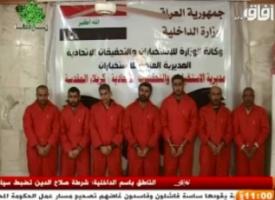
Members of the Islamic State of Iraq terrorist group and the Levant (EIIL) affiliated to Al-Qaeda, captured in Iraq, confessed to having direct links with the government of Saudi Arabia.
ABDULLAH AZZAM BRIGADES
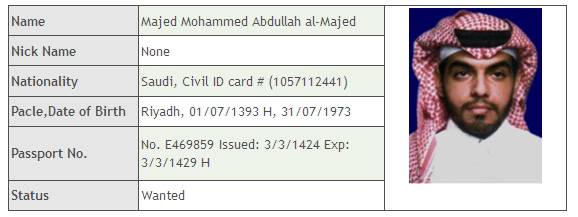
Majid al-Majid was Saudi chief of the Ab.Azzam Brigades in Lebanon until his arrest and death in custody of Lebanon's Army.
"Funding for the Sunni insurgency comes from private individuals within
Saudi Arabia and the Gulf States."�Iraq Study Group Report
al - Qa`ida's Road In and Out of Iraq,
"Saudi Arabia, Syria, and Egypt were the source of most of the foreign fighters detained in Camp Bucca, Iraq….As of April 7, 2008, the United States was holding 251 foreign fighters at Camp Bucca, Iraq. Egypt, Saudi Arabia, and Syria each contributed 19 percent of those fighters. Libyans comprise only 3 percent."
"Foreign Fighters contributed approximately 75 Percent of suicide bombers between August 2006 and August 2007."
"The plurality of suicide bombers entering Iraq between August 2006 and August 2007 were Saudi."]
"Sheikh Abdullah Rashid al-Baghdadi" was installed as head of Mujahideen Shura Council, the precursor of "Islamic State" in January of 2006. Was this the same man as Abu Bakr Baghdadi, even though he was supposedly incarcerated at Bucca at the time? Abdullah Azzam Brigades was spun-off from AQI in the process. A precursor to Al Nusra Front, "Al Nusra wal Jihad fi Bilad al Sham" split-off from AbAzzam in 2005, taking initial credit for the assassination of Rafik Hariri.
Lebanese officials say Beirut suicide bomber, his accomplice are Saudi citizens
Atrash Investigation: Two Saudi Suicide Bombers on the Loose
CONCLUSION�
Why is it that no researchers have asked the question "How did AQI suddenly acquire enough money and equipment to turn a failing terrorist entity into an "Islamic Caliphate" overnight?" Even if they did bully the Free Syrian Army and take their weapons,pull-off a "string of bank robberies," kidnappings and extortion, AQI could never have come up with enough cash to run an army, or to buy a fleet of shiny new Toyota trucks, or to become one of the best-paying employers in the Middle East, without being on some state's payroll.
peter.chamberlin@hotmail.com
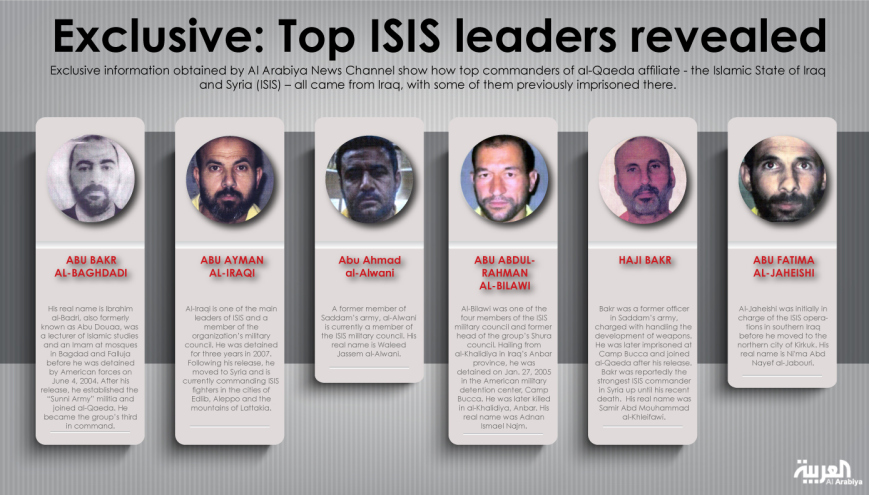
No comments:
Post a Comment